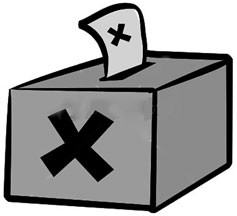A general election is on the cards
By Lalithasiri GUNARUWAN
The voter gets the rare opportunity of electing representatives of
his choice to the country's legislature for a term of six years. In a
democratic set-up the right to vote is acknowledged to be the voter's
prerogative which he has exercised during the last seven decades. It is
more than a prerogative as it is the cardinal responsibility of the
voter to elect the 'right man to the right job' - to elect only capable
people in the interest of the country's future.
 Has the voter ever performed his responsibility properly? What we
have witnessed ourselves throughout the past seven decades is that we as
voters continued the habit of making allegations and lampooning the
governments in power and also former parliamentarians for their sins of
commission and omissions. Have the voters who spoke ill of their former
parliamentarians and their excesses and abuses made the best use of the
opportunity they get after every six years? Has the voter ever performed his responsibility properly? What we
have witnessed ourselves throughout the past seven decades is that we as
voters continued the habit of making allegations and lampooning the
governments in power and also former parliamentarians for their sins of
commission and omissions. Have the voters who spoke ill of their former
parliamentarians and their excesses and abuses made the best use of the
opportunity they get after every six years?
If not the voter bears direct responsibility for the unwarranted
conduct or wrong decisions on the part of the parliamentarians. An
in-depth inquiry into this situation is of great value.
Under the previous first-past-the-post electoral system which was in
force until 1977, a voter's scope of choice remained rather limited. His
limited scope permitted him to vote only to the candidate nominated by
his party. In such a scenario the voter could exercise no choice but
vote for the party candidate while his party decision-makers and other
stalwarts are answerable to the suitability of their nominees.
The proportional representation system introduced after 1977
radically transformed the existing electoral system providing a wider
choice for the voters.
The voter can vote for the political party of his choice while
indicating his preferences to three candidates at the same time. The
ball is now in voter's court so that he can elect the responsible,
decent and capable people who can separate chaff from wheat!. If the
voter fails to make a judicious decision but blame others, he cannot any
longer point his finger to party leaders or others for his own sins.
In fact many are the shortcomings associated with the current
proportional representation system. It needs early reforms. Yet it has
its own virtues as well - the wider scope provided to the voter to elect
the best three out of the list is, one such feature!
After decades of terrorist menace normalcy prevails throughout the
country today. A country that was on the brink of bifurcation has since
been united again, consolidating its territorial integrity. It is back
on the track for fast economic recovery. People are expected to be more
conscious of their duties and responsibilities as they are on the
threshold of an another general election to elect a new parliament.
When marking the preferences, it is important for the voter to give
thought to the manner with which the former parliamentarians acted on
national issues particularly when the very survival of the country was
threatened.
The voter should ensure a parliamentary representation that would
protect the unitary structure of the country. What was the role played
by those very candidates when the national assets were sold for a song?
How did they react to the situations in which efficiency and vigilance
mattered a lot when state funds were invested in public projects? There
are some of the significant/questions lying before the voter when he is
called upon to cast his vote. He should keep in mind that his
preferential vote for the candidates who exploited the State enterprises
and strengthen his vote base by converting such enterprises into mere
"job agencies," amounts to depriving the posterity of its future. Only
decent, law-abiding and morally-rich people should represent the
national parliament. Topers and patrons of the underworld should be
outvoted and consigned to prison.
An election is a time for the voter to act wisely as it is stupid on
his part to close the stable door after the horse has bolted! Once the
election is over the people lose the power of their mandate.
It is in the hands of those voted to power, where the reins of power
lie.
Consequently it is for the voter to make the correct decision without
leaving room for later repentance. It is the need of hour to instal a
strong parliament by voting for only men or women who could act boldly
and with circumspection vis-a-vis future challenges. Your failure at
this critical juncture and its repercussions will have to be borne by
yourself alone!
(The writer is a Senior Lecturer in Economics, Colombo University.)
(Translated by K. D. M. Kittampahuwa)
|

